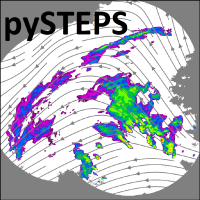pysteps.noise.utils.compute_noise_stddev_adjs#
- pysteps.noise.utils.compute_noise_stddev_adjs(R, R_thr_1, R_thr_2, F, decomp_method, noise_filter, noise_generator, num_iter, conditional=True, num_workers=1, seed=None)#
Apply a scale-dependent adjustment factor to the noise fields used in STEPS.
Simulates the effect of applying a precipitation mask to a Gaussian noise field obtained by the nonparametric filter method. The idea is to decompose the masked noise field into a cascade and compare the standard deviations of each level into those of the observed precipitation intensity field. This gives correction factors for the standard deviations [BPS06]. The calculations are done for n realizations of the noise field, and the correction factors are calculated from the average values of the standard deviations.
- Parameters:
R (array_like) – The input precipitation field, assumed to be in logarithmic units (dBR or reflectivity).
R_thr_1 (float) – Intensity threshold for precipitation/no precipitation.
R_thr_2 (float) – Intensity values below R_thr_1 are set to this value.
F (dict) – A bandpass filter dictionary returned by a method defined in pysteps.cascade.bandpass_filters. This defines the filter to use and the number of cascade levels.
decomp_method (function) – A function defined in pysteps.cascade.decomposition. Specifies the method to use for decomposing the observed precipitation field and noise field into different spatial scales.
num_iter (int) – The number of noise fields to generate.
conditional (bool) – If set to True, compute the statistics conditionally by excluding areas of no precipitation.
num_workers (int) – The number of workers to use for parallel computation. Applicable if dask is installed.
seed (int) – Optional seed number for the random generators.
- Returns:
out – A list containing the standard deviation adjustment factor for each cascade level.
- Return type:
list
